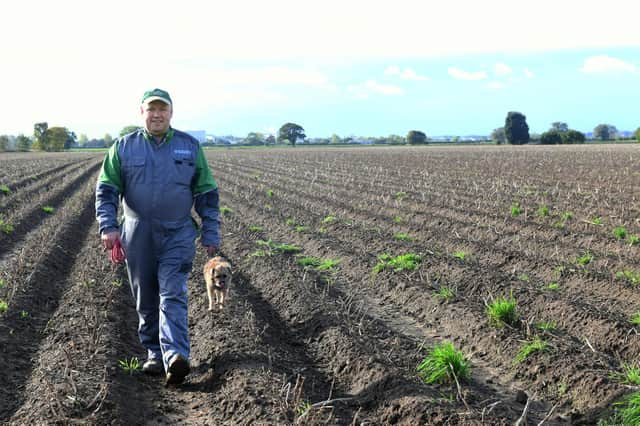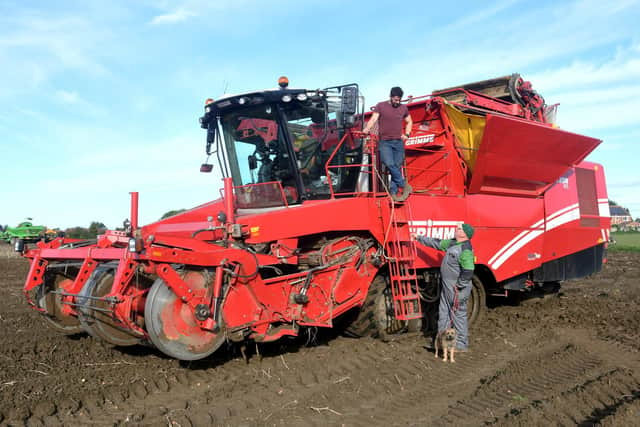Farm of the Week: West Yorkshire potato growers battling with supermarket price squeezing and resurgence of the chip shop


Brothers Charles and Jonathan Hills of Wellhouse Farm in Micklefield are the third generation to run the farming enterprise that can see them growing on up to 1,100 acres.
Charles said the variation on overall acreage they farm each year is dependent upon the potato acreage as they rent land in addition to land they own or tenant. This year has seen them with 300 acres of potatoes in the ground.
Advertisement
Hide AdAdvertisement
Hide Ad“We cut back a bit this time around because with all of the coronavirus issues last year we took an absolute smacking and decided that we couldn’t expose ourselves to quite the volume we grew last year.


“We yield in the high teens and early twenties in terms of tonnage per acre and this year we will have harvested 6,000 tonnes by the time we’ve finished. One year we had nearly 12,000 tonnes.”
Charles and Jonathan’s potatoes are largely bound for the pre-pack market but Charles said he has seen the recent regrowth of the chip shop trade and believes this may hold a key to their future.
“Most of ours are earmarked for the pre-pack market supplying supermarkets like Aldi and Tesco, but that market is getting harder as margins become tighter. The problem with farmers like us is that we are poor marketeers but love what we do, and the multiples play on that.
Advertisement
Hide AdAdvertisement
Hide Ad“While we also grow wheat, the potatoes have become all-consuming as a business. As far as our turnover is concerned they are definitely the major part, but profit has been a big issue in the past three or four years. We are trying to chase profitability.
“I don’t think our kid and me are bad farmers, but we’re not making anything despite the size we have got to. They do say that turnover is vanity and profit is sanity. We are looking for a bit of that.
“We are now growing more for the chip shop market in the north east and since we have lots of chimney pots around us and chip shops appear to be back on the up that’s one area we are aiming to get back more into.
“Fish and chip shops looked as though they were dying about 10 years ago, but they have really come back.
Advertisement
Hide AdAdvertisement
Hide Ad“We have grown the varieties Panther and Estima for chipping this year and we have Sagitta, the current chip shop favourite, planned for next year.”
Charles said that the size of operation he and Jonathan have reached is a million miles away from when their father John Francis Hills took over from their grandfather Albert after he passed away in 1952, when John was just 21.
“Mum and Dad gave us the platform and I remember seeing Dad come into the kitchen of what was then just the 220 acres we still own today and 100 acres we tenant in Allerton Bywater and I never ever remember him saying he’d had a stressful day.
“He’d say he was tired but never mention stress. I will mention stress in nearly every conversation.
Advertisement
Hide AdAdvertisement
Hide Ad“Dad filled a building with Irish cattle that he fattened up in 1975 and I well remember him making a great profit out of them. He grew around 15-20 acres of potatoes and around 100 acres of wheat and malting barley.
“Times have changed and nobody works harder than our kid. He can graft, but when a Grimme Tectron potato harvester retails at £700,000 and a potato price can still vary between £10 per tonne to £400 within 18 months it can make a mockery of going to see a bank manager with a business plan.
“We all know the potato market can be volatile but the peaks aren’t high enough and the troughs are still desperately low. That’s why I mention stress so much.”
Charles and Jonathan have been growing the potato varieties Mozart, Manitou, King Edward, Maris Piper, Estima and Panther this year. The first two are red potato varieties and 90 per cent of their crop is now red, but Charles said it is largely down to public perception that demand has gone that way.
Advertisement
Hide AdAdvertisement
Hide Ad“Red potatoes are now sought after, but for the past 20 years nobody wanted them. My theory is that the rise of the sweet potato has got people thinking that a red potato must also be sweet. It’s not. It’s the same as a white potato. But the perception is that a sweet potato is healthy and the white isn’t.
“I was quoted £90 per tonne this morning for a white potato variety and reds were at £150-£160. It’s crazy but it’s the way it is.”
Charles and Jonathan have around 600 acres of what is their owned and tenanted land that is classed as Aberford Series limestone loam.
“It is good for potatoes being lighter land and it has also always performed well for wheat and malting barley.
Advertisement
Hide AdAdvertisement
Hide AdCharles said their other major crop now takes up most of their acreage.
“We are traditionalists and stick with wheat as it is a staple. We have always grown on an eight-year rotation but we have gone more to permanent wheat and some fields are in their fifth successive year. Out of our 600 combinable acres this year we will have 540 acres of wheat.
“We are growing the varieties Skyscraper, Illuminate, Spotlight and Merit. This year we averaged 3.6 tonnes per acre. We sell some forward because when you are producing upwards of 2,000 tonnes you’ve got to know that you’ve a bit of a market.”
Charles said the public’s connection with getting hands dirty or food production has been lost.
Advertisement
Hide AdAdvertisement
Hide Ad“When you can be at a dinner party and sit down with people running multi-national companies who are convinced Morrisons produces milk or Asda produces beef you know there is a lack of knowledge.
“We don’t want potatoes to be any dearer in supermarkets, we just need a bigger share of the price as a producer.”